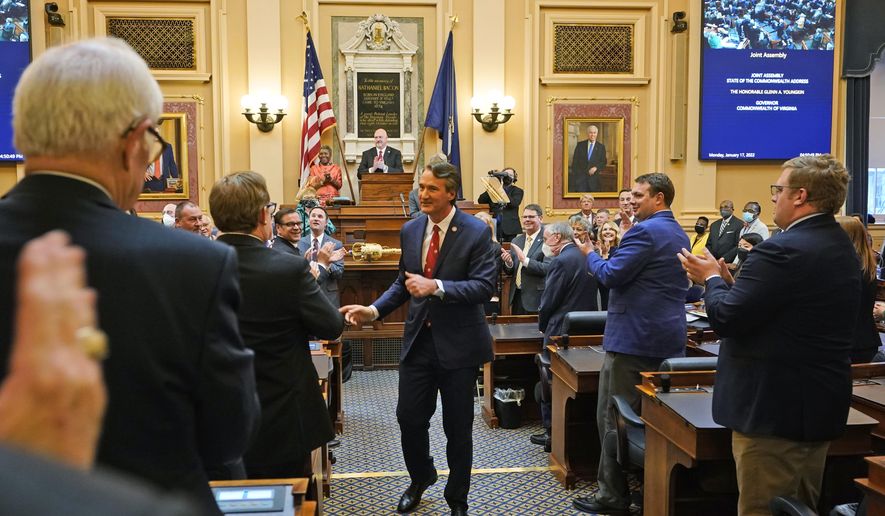RICHMOND, Va. — Gov. Glenn Youngkin asked the divided Virginia General Assembly on Monday to work with him to enact his “sweeping vision of change” for the state by rolling back taxes, expanding school choice and boosting funding for law enforcement.
In his first joint address to the Democrat-controlled Senate and GOP-controlled House, the governor reiterated many of his campaign pledges while offering some new specifics and avoiding certain issues altogether, including firearms and abortion policy.
“I’m asking each of us in this body, Republicans and Democrats alike, to come together,” he said, speaking inside the Capitol’s House chamber. “To rise above the Richmond of division, special interests, the small and the parochial and to usher in a sweeping vision of change. And to put this commonwealth on a pathway to prosperity.”
Senate Democrats, speaking to reporters after the speech, signaled continued disagreement with many of the governor’s priorities and said the political newcomer was not showing the type of bipartisanship he was asking for.
“There’s a lot of hypocrisy going on here,” said caucus chair Mamie Locke, pointing to a slew of first-day executive orders Youngkin issued that many Democrats have criticized as excessively partisan, not based in fact or exceeding the authority of the office.
Youngkin, a political newcomer who took office Saturday, has been reaching out to lawmakers from both parties since he defeated former Democratic Gov. Terry McAuliffe in November.
In his speech, he said he had heard “bipartisan agreement” that the budget would include a “record investment in education,” including a pay raise for teachers.
Locke agreed that Democrats see common ground on raising teacher pay, noting they previously had done so.
Youngkin also called on the General Assembly to allocate $150 million to meet his previously stated goal of starting 20 new charter schools.
Saying no group was under greater scrutiny than law enforcement officials, Youngkin said he hoped to lower the “temperature” around discussions of policing.
He called for dedicating $100 million in federal coronavirus relief money to a training and equipment grant program for law enforcement and said he would like to provide capital funding for a new state police training facility.
He also asked lawmakers to dedicate $26 million in state funding for police departments, but only those in localities that are increasing police funding. And he threw his support behind $5 million for a community violence reduction initiative modeled after one that began in Boston.
On taxes, Youngkin campaigned on a promise to enact a slate of substantial cuts, including onetime rebates, a suspension of the gas tax increase, the full elimination of the grocery tax, and a doubling of the standard deduction.
He made the pitch again Monday, saying Virginia’s elected leaders shouldn’t misconstrue the state’s record revenues as economic success for families facing stagnant wages in the face of inflation.
“Together we will give Virginians tax relief,” he said.
To further boost the economy, the governor said he would support a “significant” investment in megasites intended to help lure major manufacturing projects.
Outgoing Gov. Ralph Northam earmarked $150 million in his proposed budget for such projects.
A 2019 AP review found the state has already sunk more than $100 million into land acquisition and development at a handful megasites dotting Virginia’s struggling rural south and southwest regions with little to show for it. But economic development officials say without ready-to-go sites, the state will continue to miss out on transformational economic development opportunities.
Youngkin did not address his thinking on gun or abortion legislation, two areas where he also sought to avoid specifics on the campaign trail. Nor did he explicitly address climate change, though he vowed to protect Virginia’s natural resources, including by ending the dumping of raw sewage in the James River; boosting funding for farm-management practices to protect the Chesapeake Bay; and creating a Coastal Virginia Resiliency Authority to address sea-level rise.
Other action Monday highlighted the partisan divide of the General Assembly.
For instance, Senate Democrats advanced a measure out of committee that would eliminate nearly all mandatory minimum sentences. But Garren Shipley, spokesperson for the House GOP caucus, said he expected the measure had poor prospects in the House, where two former prosecutors would play a key role in deciding its fate.
The issue had a been a top criminal justice priority last year, when Democrats were in full control of state government, but fell apart at the last minute due to intraparty disagreement.
Senate Democrats on a different committee also killed a measure from a GOP colleague that would have halted scheduled increases to the state’s minimum wage. The House could advance its own bill, but it would still need Senate signoff to reach Youngkin’s desk.




Please read our comment policy before commenting.